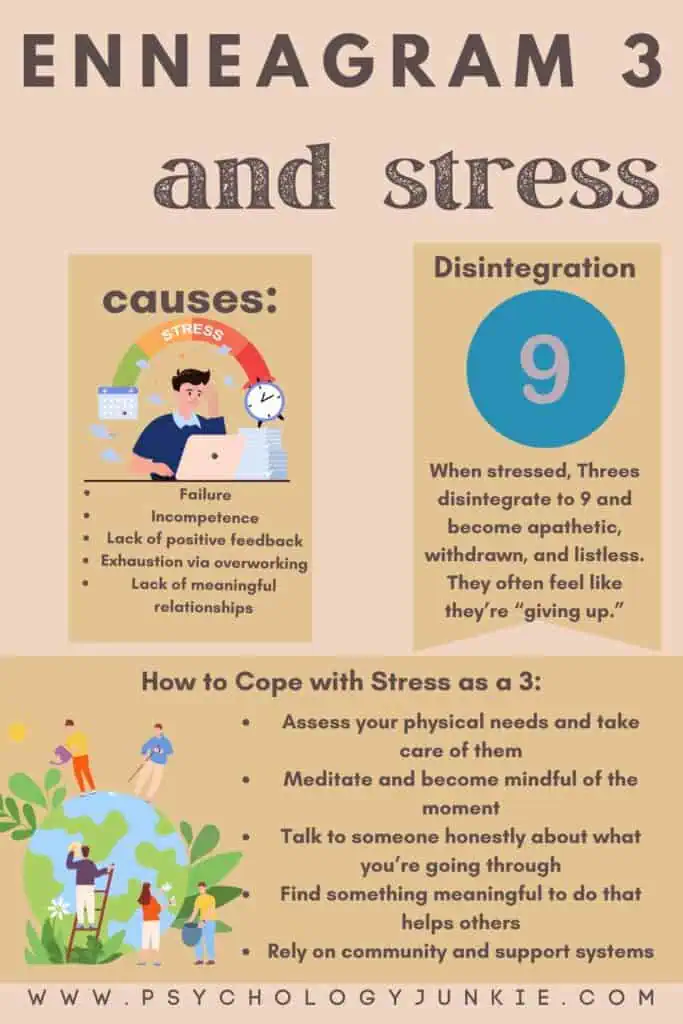The Enneagram 3 and Stress: Finding Balance and Meaning Beyond Success
Let’s talk about being a Three. You’re the achiever, the doer, the one who gets things done and makes it look effortless. But let’s be real—underneath all that drive, there’s a weight that comes with always needing to prove yourself. It’s exhausting to feel like there’s always another rung on the ladder to reach for; like the one you’re at is always at risk of breaking beneath your feet. You feel like you’ve got to prove that you’re “worthy” or “good enough.” But it never feels like you’re quite there. There’s always something else you need to achieve in order to feel like you’ve “arrived.”
Here’s the thing: when things are going well—when you’re hitting your goals and getting recognition—you’re unstoppable. You’re in your element. But when stress hits? When progress slows or someone doesn’t notice all your hard work? That’s when the cracks start to show. Stress for a Three can feel like total failure and burnout. It can feel like all your hard work and energy and efforts to be exceptional count for nothing.

Not sure what your enneagram type is? Take our new Enneagram test here!
What Stress Looks Like for Threes
When stress creeps in, it can feel like you’re losing your spark. You’re used to charging ahead, but suddenly, you’re stuck. Maybe you start avoiding the hard stuff or distract yourself with busywork—anything to avoid facing what’s really going on. You might even catch yourself daydreaming about the next big win, hoping it’ll fix everything. Spoiler alert: it won’t.
I’ve seen this happen with so many Threes I’ve coached. One moment, you’re all systems go, and the next, it’s like someone flipped a switch. You’re listless, disengaged, maybe even snappy with the people around you. And they’re confused—“What happened to the driven, focused person I know?” The truth is, you’re confused too. It’s hard to explain that the pressure to succeed feels like it’s crushing you.
Signs That an Enneagram 3 is Stressed:
- Feeling stuck or unmotivated: You’re usually driven, but stress makes you feel like you’re spinning your wheels with no traction.
- Avoidance behaviors: Instead of tackling the hard stuff, you might distract yourself with busywork or meaningless tasks to avoid facing deeper issues.
- Daydreaming about success: You might escape into fantasies about your next big win, hoping it’ll fix everything.
- Emotional disconnection: You may bottle up your feelings or avoid them entirely, thinking emotions will just get in the way.
- Apathy or disengagement: In extreme cases, you might withdraw, becoming listless and uncharacteristically passive.
- Heightened sensitivity: Criticism or lack of recognition feels sharper than usual, making you feel even more off balance.
- Excessive self-criticism: You might beat yourself up for perceived failures, believing you should’ve worked harder or done better.
- Disconnection from purpose: Stress pulls you away from what truly matters, leaving you questioning your goals and motivations.
Examples from the Real World
I once worked with a Three who was wildly successful—a top executive in her field. To everyone else, she had it all: the career, the lifestyle, the admiration. But her relationships were full of tumult and frustration. She felt empty. She poured everything into her work because deep down, she thought if she just achieved enough, she’d finally feel worthy. But her home life was overwhelming, and she wound up in relationships with people who were manipulative, using her as a means to an end (financial prosperity and fun) rather than really caring about her. When stress hit, she’d shut down. She’d dissociate, blame others, and retreat into this haze of apathy—until the guilt kicked in and she threw herself back into work, starting the whole cycle over again. While she was a huge success professionally, personally her life felt very lonely. She realized in her 40s that all the goals she’d worked for hadn’t really made her happy. At the end of the day, the simple things in life, the things money can’t buy, were what she really wanted. She wanted a sense of home, someone to hug, a feeling of belonging.
Then there was another Three I worked with who burned out trying to prove they were “good enough.” They kept pushing, taking on more and more, until they finally collapsed. They had a cycle of working themselves to exhaustion and then going nonverbal completely. For weeks, they barely spoke to anyone. What turned things around? Volunteering. They started helping at a soup kitchen and delivering blankets to people in need—not for recognition, but just to help. This sounds simple, but it was a really long and complicated process (with a lot of therapy to help). For this Three, getting out and doing something meaningful that had no relation to their image or success was what pulled them out of their self-defeating cycle.
What Triggers Stress for Threes:
- Lack of Progress
When the to-do list grows but nothing gets crossed off, it’s like nails on a chalkboard for a Three. Progress equals purpose, and when you don’t see movement toward your goals, it can leave you feeling anxious and overwhelmed.
- Feeling Unacknowledged
You want people to notice when you do a good job (it’s human, don’t worry). When you put your heart into something and no one notices, it can feel like a gut punch. Maybe you delivered the best pitch of your career or spent weeks on a project, only to hear crickets.
- Perceived Failure
Mistakes and setbacks hit differently for a Three. It feels personal. Failing to meet a goal, missing a deadline, or losing in any capacity can trigger a spiral of self-doubt. “What does this say about me?” becomes the lingering thought, and you might obsess over how people are feeling about you, assuming the worst judgment and feeling ashamed.
- Comparisons to Others
Threes naturally notice success in others, but when you’re stressed, those comparisons can turn toxic. Seeing someone else excel while you’re struggling can make you feel like you’re a complete failure. The “Why can’t I be like that?” loop starts playing, and it’s hard to turn off.
- Being Surrounded by Incompetence
You’re always trying to be as competent as possible. You push yourself and aren’t afraid of working hard to achieve your goals. So being stuck in a team or environment where people don’t share your drive can be maddening. Whether it’s coworkers who drop the ball or friends who lack vision, it feels like you’re carrying the weight of the world while everyone else coasts.
- Unclear Goals or Directions
You need to know where you’re headed and how to get there. When the path forward is hazy or you’re in a situation without clear expectations, it’s unsettling. You might overcompensate by taking on more responsibility or pushing yourself harder—both of which only fuel the stress.
- Overcommitting
You’re ambitious, so it’s easy to say “yes” to everything, thinking you can handle it all. But when the workload piles up and deadlines loom, the pressure becomes suffocating. That drive to be everything to everyone backfires, leaving you feeling overwhelmed and stretched too thin.
Ways to Cope and Grow
When stress hits, it feels like the universe has handed you a giant “You’re Not Enough” poster and expects you to hang it in your living room. But here’s the truth: that voice in your head telling you to work harder, push more, and pretend you’re fine? It’s lying. You don’t need to be a superhero 24/7. Let’s talk about some ways to get back to center—without burning yourself out in the process. But first, let’s talk about integration. Because that’s a big part of getting de-stressed.
What Is Integration?
Integration is all about growth. In Enneagram terms, it’s the process of moving toward the healthier traits of the type connected to yours by one of the arrows on the Enneagram diagram. These arrows aren’t just there to look cool—they represent pathways that show how we respond to life under stress (disintegration) and during growth (integration).
For Threes, integration means moving toward the strengths of a Six. This doesn’t mean you become a Six, but rather, you borrow some of their best qualities to balance out your personality and help you grow. It’s like adding tools to your toolbox.
Why Do Threes Integrate to Six?
As a Three, you have a drive to succeed and be admired. But all of this can be fleeting and exhausting. And while that drive can be amazing, it can also pull you away from who you really are and what you truly value. Enter the Six.
Sixes focus on loyalty, trust, and collaboration. They’re very community minded. At their best, they courageously protect their communities and work to make life more secure and stable. They remind you that you don’t have to go it alone, and that success doesn’t always mean doing everything yourself. When you integrate toward Six, you learn to rely on others, focus on shared goals, and root yourself in authenticity rather than getting praise. It’s a game-changer, really.
How Integration Feels for Threes
At first, it can feel a little foreign. You’re used to being the one in charge, the one with the plan, the one everyone looks up to. Letting go of that image—or even admitting you need help—can feel uncomfortable. But as you lean into those Six-like qualities, something amazing happens: you start to feel grounded. Stable. Like you don’t have to keep running a marathon to prove your worth. You can just be, and that’s enough.
Ways to De-Stress and Integrate to Six:
Reconnect with What Actually Matters
Take a minute and ask yourself: Why am I doing this? Are you chasing this goal because it excites you, or are you just hoping for a round of applause at the end? Because here’s the thing: applause is fleeting, but working toward something that means something? That’s where the magic is. Sit down, make a list of what’s really important to you, and use that as your compass.
Pause Before Acting
Sixes are cautious and thoughtful, which balances a Three’s drive to act quickly. Take a moment to look at your motives and decide whether they align with the kind of values you want to emulate.
Be Kind to Yourself
You wouldn’t call your child or your best friend a failure because they had a bad day. So why do it to yourself? Give yourself permission to mess up, to be human, to take a break. Perfection isn’t the goal here—progress is. And progress looks a lot better when you’re not tearing yourself apart in the process.
Talk to Your People
I read an article yesterday that said one of the ways to live longer and have more mental clarity later in life is to develop meaningful relationships in middle life. Science actually shows that friendships help you live longer. So here’s a wild idea: let someone see the real you. Share what you’re struggling with. Let your guard down. I promise, the world won’t end if you admit you’re having a hard time. In fact, you might be surprised at how much better you feel when someone “gets it.”
Do Something That’s Not About You
One of the best ways to feel better about your life and where you’re going is to do something that helps a bigger cause. Help a neighbor or bring donuts to your coworkers just because. When you’re not fixated on proving yourself, you’ll realize how much joy there is in simply being there for others.
Rest Like It’s Your Job
You don’t have to earn rest. You’re allowed to take a break even if you haven’t checked every box on your to-do list. Watch a movie. Go for a walk. Take a nap. Seriously, naps are magical and I will die on this hill.
What Do You Think?
Stress isn’t easy for anyone, but as an Enneagram 3, it can feel particularly heavy. Your drive to achieve, succeed, and stand out is part of what makes you incredible—but it’s not the whole story. You’re more than your accomplishments, more than your to-do list, and definitely more than the approval of others. Remember that.
When stress hits, take it as a big sign to pause, reflect, and recalibrate. Reconnect with what truly matters to you—not what looks good on paper, but what lights you up inside. Lean on your loved ones, practice vulnerability, and trust that you don’t have to do it all alone. Integration to Six is about finding stability in community, loyalty, and authenticity. It’s not about giving up your ambition; it’s about anchoring it in something deeper and more meaningful.
You have so much to offer the world, and the more you lean into the healthier traits of a Six, the more you’ll discover that your worth isn’t tied to what you do. It’s tied to who you are. And who you are is already pretty extraordinary.
So, take a breath, give yourself some grace, and remember: growth isn’t a straight line. It’s a journey, and you’re allowed to take your time.
Other Articles You Might Enjoy:
10 Telltale Signs of an Unhealthy Enneagram 3
21 Signs That You’re an Enneagram 3 “Achiever”
Subscribe to Our Newsletter

Want to discover more about personality type? Get the inside scoop with Susan Storm on all things typological, along with special subscriber freebies, and discounts on new eBooks and courses! Join our newsletter today!












